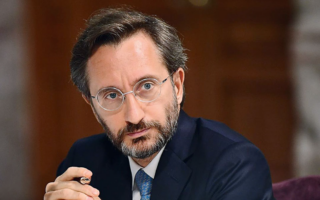The financial system will not collapse
Eurasia Group head Ian Bremmer talks to Kathimerini about recent banking failures

The global financial system will not collapse from the turbulence caused by the demise of Silicon Valley Bank, Signature Bank and the problems facing Credit Suisse, as governments and the relevant international institutions have learned from the past; however, there will be further problems in the markets, as high inflation makes it difficult to manage the situation, the president of Eurasia Group, Ian Bremmer, told Kathimerini.
For the United States in particular, Bremmer believes it could face a sharp credit-driven recession that will weaken the economy between now and the 2024 election. At the same time, he notes that Russia, for its part, views any crisis that affects the capabilities of the West as positive, while China, given its size and role in the global economy, does not want to disrupt stability, but at the same time sees opportunities in the West’s weaknesses.
Has the West learned from the crises it faced in the recent past – in the US from Lehman Brothers and in Europe from Greece?
Policy makers have learned from the past – they are drawing from the global financial crisis and Covid playbooks and bringing a bazooka – the lesson being that they need to move fast and hard to try and stop the run and ring-fence liquidity threats. This time is different in that their credibility is tied to getting inflation under control, which makes for a tough balancing act, and an even harder communication challenge.
What possible repercussions – financial and geopolitical – do you see from the present banking volatility?
I don’t think the financial system will collapse – the reforms post-global financial crisis have increased resilience – but I doubt we are done yet and there are surely more problems still to come out. The broader risk is whether these developments cause a broad-based tightening of credit and financial conditions, which will worsen recessionary headwinds and put immense pressure on policy makers, many of which have limited policy flexibility after four years of pandemic.
Could it deteriorate into another 2007-2008?
‘Banking crises are sentiment-driven and policy makers need to be humble that they have this under control’
I don’t think so, but it’s only Thursday. Banking crises are sentiment-driven and policy makers need to be humble that they have this under control. In both the United States and Europe, policy makers understand this and are prepared to do more. That gives me comfort.
How does the situation in the European banking system compare to that in America?
They have less dependence on technology, but longer-term structural profitability challenges make them vulnerable to shock.
What do the different major players, starting with the US, hope for or fear in the present situation?
For the Biden administration, it’s a cascade of bank failures that requires multiple interventions and a mounting cost to the taxpayer. It’s not their base case expectation, but it’s their fear. Beyond that, it’s a sharp credit-driven recession that weakens the economy between now and the 2024 election.
For Europe?
I would say Europeans are the same.
And what about “outside” players like Russia and China?
For Russia, any sharp material economic pain in the West that could reduce appetite for sanctions and support for Ukraine is in their strong interest. China is in between these two poles – they want overall economic stability, but have geopolitical opportunity that comes from Western weakness.





